Embarking on a career in real estate can be both exhilarating and daunting, especially for aspiring agents seeking sponsorship. Choosing the right real estate broker to sponsor you is a pivotal decision that can significantly impact your success and professional growth in this competitive industry. Furthermore, a sponsoring broker real estate provides crucial guidance, resources, and mentorship as the foundation for your real estate journey.
In this article, we will explore essential tips and considerations to help you find a reputable and supportive broker to sponsor you. From understanding the role of a sponsoring broker real estate to evaluating their experience, reputation, and market knowledge, we will examine the key factors that will help you in making a knowledgeable choice.
Requirements for Becoming a Real Estate Broker
Becoming a real estate broker opens up a world of opportunities in the exciting and rewarding field of real estate. However, it’s crucial to understand the requirements and steps involved in obtaining a broker’s license. Let’s explore these requirements in detail:
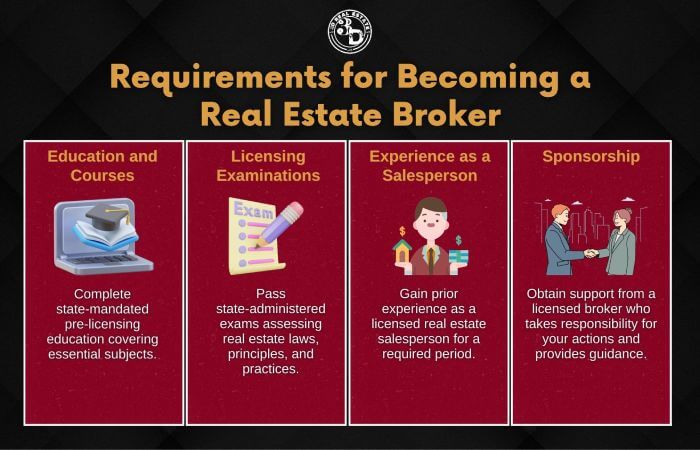
Becoming a real estate broker opens up opportunities in the exciting and rewarding real estate field. However, it’s crucial to understand the requirements and steps involved in obtaining a broker’s license. Let’s explore these requirements in detail:
- Education and Courses: In order to qualify as a real estate broker, you must successfully finish the prescribed pre-licensing education courses mandated by your state’s regulatory body. These courses cover essential subjects such as contracts, property management, mortgage financing, ethics, etc. The curriculum equips you with the knowledge and skills necessary to excel as a broker.
- Licensing Examinations: After completing the required courses, you must pass the licensing examinations administered by your state’s real estate regulatory body. The exams assess your understanding of real estate laws, principles, and practices. It’s important to note that the exam format and content can vary significantly from state to state. Some states may require multiple exams, while others have a comprehensive test covering all aspects of being an effective broker.
- Experience as a Salesperson: In most states, one of the prerequisites for becoming a broker is having prior experience as a licensed real estate salesperson. This experience allows you to gain practical knowledge, skills, and a solid foundation in the real estate industry before advancing to the broker level. The required experience period typically ranges from two to four years.
- Sponsorship: Once you’ve met all the necessary criteria, obtaining support from a licensed broker is the final step in getting your brokerage license approved. The sponsoring broker real estate is an experienced professional who takes responsibility for your actions as a broker and provides guidance as you navigate your career. In some states, having a sponsoring broker real estate is a requirement before you can obtain your broker’s license.
Understanding and fulfilling these requirements is essential for aspiring real estate brokers. In addition, it’s vital to familiarize yourself with your state’s specific regulations and consult your state’s real estate commission or licensing board for accurate and up-to-date information. You can venture on a successful journey as a licensed real estate broker with the proper education, preparation, and guidance.
Understanding the Role of a Real Estate Broker
When beginning on the journey of buying or selling a home, enlisting the services of a real estate broker can be immensely valuable. These professionals possess the knowledge, skills, and expertise necessary to navigate the complexities of the real estate market and ensure a successful transaction. Here are five key roles of a real estate broker:
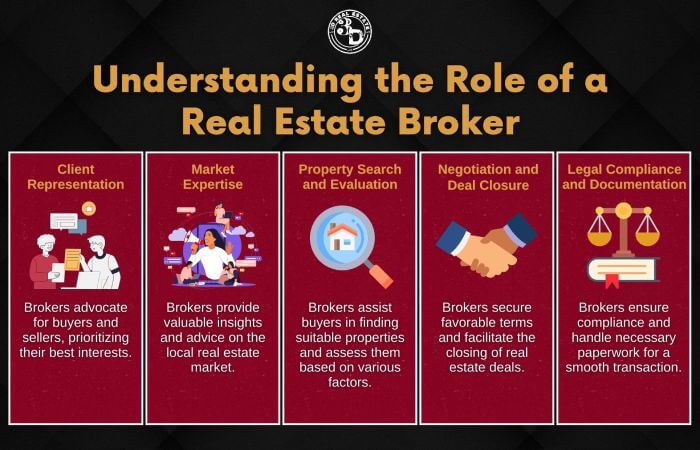
- Client Representation: A real estate broker represents buyers and sellers, advocating for their client’s best interests throughout the transaction process.
- Market Expertise: Brokers possess in-depth knowledge of the local real estate market, including the latest market patterns, property appraisals, and neighborhood characteristics. This expertise enables them to provide valuable insights and advice to their clients.
- Property Search and Evaluation: Brokers assist buyers in finding suitable properties that align with their needs, preferences, and budget. They have access to extensive property listings and can evaluate properties based on various factors, such as location, amenities, and potential for appreciation.
- Negotiation and Deal Closure: Brokers play a crucial role in settling the terms and conditions of real estate deals. They leverage their experience and expertise to ensure clients get the best possible deal. They also guide clients through closing, coordinating with other professionals, and overseeing the necessary paperwork.
- Legal Compliance and Documentation: Real estate transactions involve legal and administrative tasks, such as drafting contracts, reviewing documents, and ensuring compliance with local laws and regulations. Brokers navigate these complexities, ensuring that all necessary legal requirements are met.
By comprehending the roles and responsibilities of sponsoring broker real estate, you can better appreciate their value in guiding you through the home buying or selling process. Now, let’s delve into practical ways to research potential brokers who possess these essential qualities.
How to Research Potential Sponsors
Finding the right sponsoring broker real estate for you is critical for success in your career. Therefore, you should perform your due diligence when researching potential sponsors and ensure they meet your needs and expectations. Here are some recommendations on how to research potential sponsors:
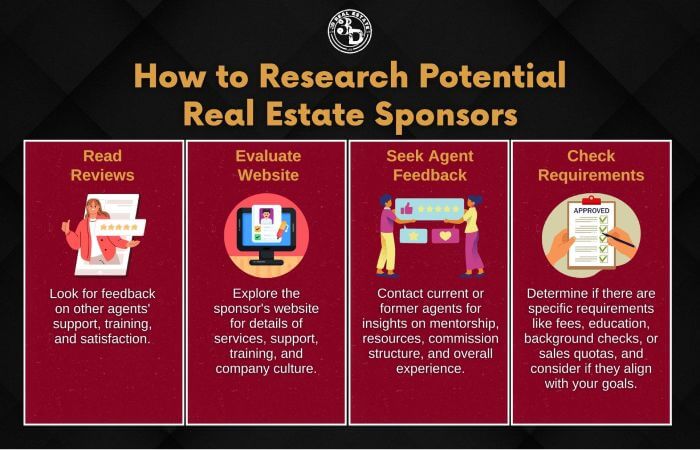
- Read online reviews
Look for reviews and testimonials from other agents who have worked with the broker. These reviews can provide insights into the level of support, commission splits, training, and overall satisfaction with the sponsor. Websites like Yelp, Google My Business, or real estate-specific platforms can be good sources for these reviews.
- Evaluate their website
Take the time to explore the sponsor’s website thoroughly. Look for information about their services, support systems, training programs, company culture, and any other essential details. A well-designed and informative website can indicate a professional and organized sponsor.
- Seek feedback from current or former agents.
Reach out to agents who have previously worked with the sponsor or brokerage or are currently affiliated with them. Ask specific questions about their experience, such as the level of mentorship, available resources, commission structure, and any challenges they faced. This firsthand information can provide valuable insights into what it’s like to work with the sponsor.
- Check for requirements and compatibility.
Pinpoint if there are any specific requirements to join the sponsor or brokerage. These requirements may include licensing fees, educational prerequisites, background checks, or sales quotas. Consider whether these requirements align with your own goals and capabilities. Ensuring that the sponsor’s expectations and standards are compatible with your career aspirations is essential.
Considering all these factors before signing up with a new sponsor, you can ensure that you choose an agency best suited for your business goals and lifestyle preferences. Researching sponsors requires careful consideration of their advantages and limitations; however, doing so will ultimately pay off as it puts you in a better position to maximize the benefit of having them as your partner!
Making the Most of Interviews

Preparing for interviews with potential sponsoring broker real estate requires thorough research and strategic planning. Before each interview, it is crucial to gather information about the brokerages you’ll be meeting with and formulate relevant questions highlighting their unique value proposition and career development opportunities. In addition, creating connections during the interview is essential, so consider ways to naturally demonstrate your long-term commitment to working with them.
When presenting your pitch, focus on showcasing your experience and qualifications that align with the brokerage’s needs. It’s important to convey enthusiasm without overselling yourself, allowing the facts to speak for themselves. Develop a well-crafted closing statement summarizing why you would be an excellent fit for the sponsoring broker real estate and the unique traits that distinguish you from other candidates.
Now that we have tackled some basics on preparing for interviews, let’s move on to discussing strategies for negotiating an agreement.
Negotiating an Agreement
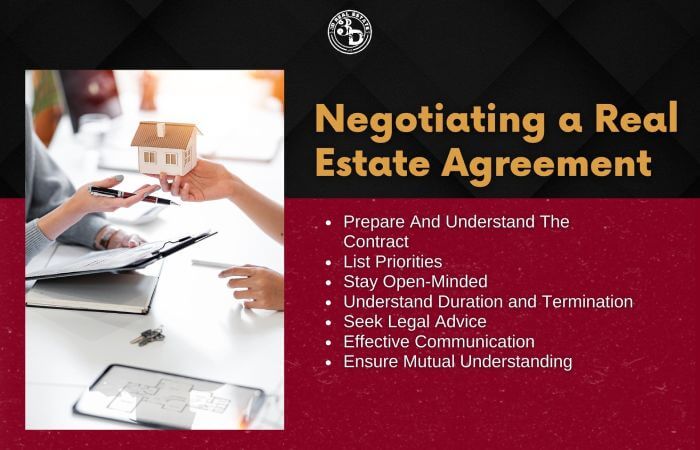
When negotiating with a real estate broker for a sponsorship agreement, it is essential to be well-prepared. Begin by thoroughly understanding the details of the contract and carefully reading the fine print to avoid any confusion. Next, list your priorities, such as salary requirements or specific projects, and be ready to discuss them during negotiations. Maintaining an open-minded approach is vital, and only taking things personally if the broker’s offer meets your initial expectations is critical.
Both parties should clearly understand the duration of the sponsorship and any termination clauses that may apply if the agreement is ended prematurely. In addition, it may be wise to seek the advice of an attorney to evaluate the contract before signing it, as this can potentially prevent costly mistakes in the future.
By keeping these tips in mind and maintaining open and effective communication, you will be better equipped to negotiate a fair broker agreement that satisfies both your and the broker’s needs. Ensuring that all parties involved clearly understand their responsibilities and expectations before finalizing the contract is crucial.
Benefits of Having a Sponsor
Having a sponsor in the real estate industry can make a significant difference in an agent’s career. A sponsor provides support, guidance, and access to valuable resources that can help agents excel in their profession. Here are the five perks of having a sponsor:
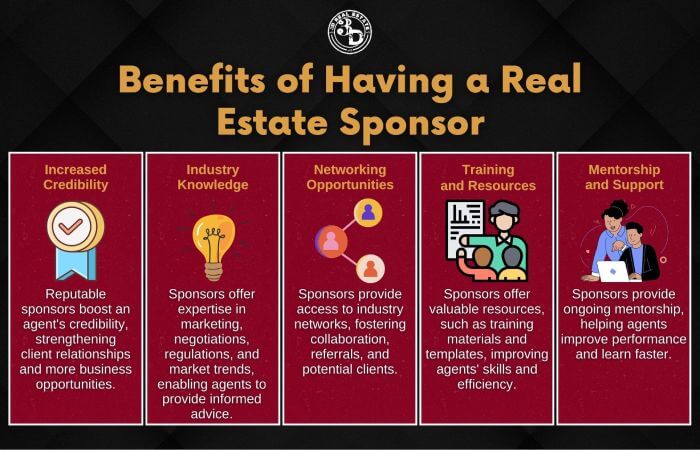
- Increased Credibility: Partnering with a reputable broker as a sponsor adds credibility to an agent’s profile. Clients feel more confident working with an agent backed by a trusted and knowledgeable professional, leading to stronger relationships and increased business opportunities.
- Access to Industry Knowledge: Sponsors bring extensive knowledge of the real estate business, including expertise in marketing, negotiations, and understanding legal regulations and market trends. This knowledge enables agents to provide informed advice to their clients, ensuring smooth and successful transactions.
- Networking Opportunities: Sponsors often have established networks within the real estate industry. Agents gain access to these networks by aligning with a sponsor, expanding their reach, and opening doors to collaboration, referrals, and potential clients. As a result, networking can significantly boost an agent’s business growth.
- Training and Resources: Sponsors provide access to valuable resources such as training materials, contract templates, and sales-related documents. These resources enhance an agent’s skills and efficiency, saving time and effort while delivering high-quality service. In addition, continuous education and access to tools contribute to an agent’s professional development.
Mentorship and Support: Sponsors offer mentorship and ongoing support to agents, particularly in the early stages of their careers. Through mentorship sessions and deal reviews, experienced brokers provide valuable feedback and guidance, helping agents improve their performance and accelerate their learning curve.
The Bottom Line
Finding a real estate broker to sponsor you can be tough, but with research and preparation, it can be rewarding. First, choose a knowledgeable broker through thorough research and interviews. Then, negotiate mutually beneficial terms to establish a strong relationship. A good sponsoring broker real estate provides crucial support, guidance, and quick industry learning, enabling you to build customer relationships and start your career effectively.
At 3D Real Estate, we acknowledge the challenges of finding a sponsoring broker real estate industry. However, with our expertise and dedication, we can help you to kickstart your career. So, contact us today.




